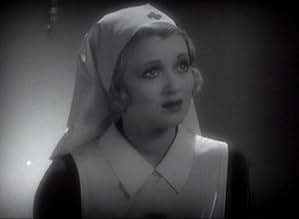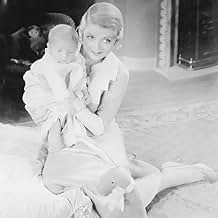A war officer who is thought dead returns to the woman he loves, only to find that she has remarried.A war officer who is thought dead returns to the woman he loves, only to find that she has remarried.A war officer who is thought dead returns to the woman he loves, only to find that she has remarried.
- Awards
- 1 win total
Daisy Belmore
- Tibbetts - Nurse
- (uncredited)
Billy Bevan
- Departing British Soldier
- (uncredited)
Edmund Breon
- Tom Kent
- (uncredited)
Eddy Chandler
- Captain Peters
- (uncredited)
Jay Eaton
- Dancing Doughboy
- (uncredited)
Bill Elliott
- Dancing Doughboy
- (uncredited)
Fred Esmelton
- Ponsonby's Butler
- (uncredited)
Mary Forbes
- The Duchess
- (uncredited)
Elizabeth Forrester
- Evelyn Kent
- (uncredited)
Robert Greig
- Hansom Cabby
- (uncredited)
Olaf Hytten
- Aide to Major General
- (uncredited)
Claude King
- Major General Visiting Hospital
- (uncredited)
Featured reviews
Born to Love (1931) is rather silly but nevertheless is a good example of a candid treatment of divorce law before the Production Code of 1935 put a stop to serious treatment of divorce or of pre-marital sexuality. Stuck in a loveless marriage to Wilfred, a haughty English aristocrat, Doris causes Wilfred to believe she has committed adultery. The consequences to her are catastrophic.
The plot is creaky and relies on numerous contrivances. The acting is highly forgettable. Nevertheless, the issues of fault-based divorce are important ones. The movie also concerns the conflict between marriage as an institution for love and fulfillment as opposed to a unemotional union designed for the mutual support of spouses and children. Needless to say, divorce law in the old days was much better adapted to the latter vision of marriage than the former.
The plot is creaky and relies on numerous contrivances. The acting is highly forgettable. Nevertheless, the issues of fault-based divorce are important ones. The movie also concerns the conflict between marriage as an institution for love and fulfillment as opposed to a unemotional union designed for the mutual support of spouses and children. Needless to say, divorce law in the old days was much better adapted to the latter vision of marriage than the former.
Not uninteresting pre-Code soap suds, wherein Yankee nurse Bennett, in London (nice historical touch: a bus advertising "Chu Chin Chow") meets Captain Joel McCrea, they have a torrid romance and pledge their troth, and while carrying his child she hears he's dead. We know he's not--he's second-billed, and there's an hour to go--but she thinks he is, so she marries Paul Cavanagh on the rebound and we wait for the fireworks that will erupt when McCrea returns. Connie's histrionic- -she gets to love, yell, sob, scream, and put on a phony British accent, even though she's playing American--and Paul Stein's camera likes to linger on her overemoting. But Joel McCrea was certainly the personification of solid masculine American values circa 1918 or 1931, and his sincere underplaying nicely complements her overplaying. The screenplay doesn't hate her for having a child out of wedlock, and the happy ending isn't that happy. So, by 1931 standards, it's an adult movie. Just not a very good one.
I saw the last part of this on TCM; it was Joel McCrea day.
It didn't really fit -- this is Constance Bennett's movie, 100%, and that's the problem. This has to be one of the worst performances of her career. Even making allowances for 1931, she is very histrionic and melodramatic, in all the worst, most silent-movie-cliché ways.
Technically, Paul L. Stein's direction is fine (for 1931), but it appears from this he was not an "actor's director". Oddly, Ms. Bennett's next film, "The Common Law," re-teamed her with director Stein and costar McCrea. It is better; not memorable, but at least she isn't painfully bad in this one.
It didn't really fit -- this is Constance Bennett's movie, 100%, and that's the problem. This has to be one of the worst performances of her career. Even making allowances for 1931, she is very histrionic and melodramatic, in all the worst, most silent-movie-cliché ways.
Technically, Paul L. Stein's direction is fine (for 1931), but it appears from this he was not an "actor's director". Oddly, Ms. Bennett's next film, "The Common Law," re-teamed her with director Stein and costar McCrea. It is better; not memorable, but at least she isn't painfully bad in this one.
During WWI, an American nurse, Doris (Constance Bennett) meets up with an American serviceman, Barry (Joel McCrea) and soon the pair are in love. Since this is a pre-code picture*, the pair apparently slept together before he shipped out for France...with the promise to marry her when he returned. However, she soon receives word that Barry has been killed...and she is pregnant. The ardent suitor, Sir Wilfred, still wants to marry her despite this and so she agrees. No one is apparently the wiser that the baby was not his other than Sir Wilfred and his new bride...and things appear very happy. However, when Barry returns and it's obvious he was not killed in action but only injured, Doris has some tough choices...as does Sir Wilfred. Unfortunately, Sir Wilfred does NOT rise to the occasion. What exactly happens? Well, see the film and be prepared for a few surprises.
What I appreciated about this film is that it took a somewhat familiar story idea and cast all sorts of unexpected events as well. The story is NOT one you'll be predicting long before things occur. Additionally, for a 1932 film the acting is quite nice. Well worth your time.
*In films released after July, 1934, this story would have either not been filmed at all or would have been heavily edited due to the premarital sex in the plot. Such things were pretty much taboo in the post-code era...a time period during which Hollywood began making more wholesome and less sordid movies. And, while I love the pre-code films, as they are very entertaining, some of the films did get a bit too racy considering that there was no rating system and anyone could have been in the audiences to see topless girls in "Ben Hur" (1925), lechrous bosses who refused to keep their hands off the women at work ("Employees Entrance") and women who sleep their way to the top...and somehow remain there by the end of the story ("Red-Headed Woman"). I don't think this film really has anything offensive at all about in it...but a few pre-code films did seem to really push the envelope!
What I appreciated about this film is that it took a somewhat familiar story idea and cast all sorts of unexpected events as well. The story is NOT one you'll be predicting long before things occur. Additionally, for a 1932 film the acting is quite nice. Well worth your time.
*In films released after July, 1934, this story would have either not been filmed at all or would have been heavily edited due to the premarital sex in the plot. Such things were pretty much taboo in the post-code era...a time period during which Hollywood began making more wholesome and less sordid movies. And, while I love the pre-code films, as they are very entertaining, some of the films did get a bit too racy considering that there was no rating system and anyone could have been in the audiences to see topless girls in "Ben Hur" (1925), lechrous bosses who refused to keep their hands off the women at work ("Employees Entrance") and women who sleep their way to the top...and somehow remain there by the end of the story ("Red-Headed Woman"). I don't think this film really has anything offensive at all about in it...but a few pre-code films did seem to really push the envelope!
It is WWI. Brooklyn gal Doris Kendall (Constance Bennett) meets American flyer Captain Barry Craig (Joel McCrea) during a Zeppelin attack in London. She is later told that he has been shot down and presumed dead. Her friend Sir Wilfred Drake (Paul Cavanagh) proposes marriage. She tells him that she's pregnant with Barry's baby. He marries her anyways. It turns out that Barry is still alive.
This is a rather boring story for the first hour. It's a lot of things that keep it that way. The movie makes a dramatic turn at around the hour mark. It needed the villainous turn to raise the intensity. By then, most of the audience has probably lost interest. Then it takes a dark turn that feels undeserved. I don't really understand Wilfred at that moment.
This is a rather boring story for the first hour. It's a lot of things that keep it that way. The movie makes a dramatic turn at around the hour mark. It needed the villainous turn to raise the intensity. By then, most of the audience has probably lost interest. Then it takes a dark turn that feels undeserved. I don't really understand Wilfred at that moment.
Did you know
- TriviaThe first of four films co-starring Constance Bennett with Joel McCrea, the other three being The Common Law (1931), Rockabye (1932), and Bed of Roses (1933).
- GoofsIn an early sequence set in 1918, Constance Bennett is shown playing a phonograph record on the Victor label--but the label is the "scroll design" Victor didn't use until 1925.
- Crazy creditsDebut of actress Eily Malyon.
Details
Box office
- Budget
- $338,000 (estimated)
- Runtime
- 1h 21m(81 min)
- Color
Contribute to this page
Suggest an edit or add missing content









































